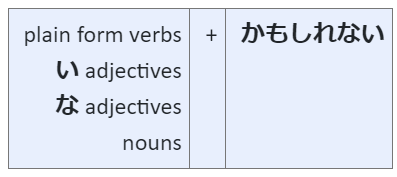VCE Japanese Grammar Patterns
1/43
Earn XP
Description and Tags
VCE Units 3/4 Japanese Second Language Grammar Patterns (as taught through Victorian School of Langauges - VSL)
Name | Mastery | Learn | Test | Matching | Spaced | Call with Kai |
|---|
No analytics yet
Send a link to your students to track their progress
44 Terms
I can…
Dictionary form verb + ことができます
Example: すしをつくる ことができません。 (I can't make sushi.)
I like…
Dictionary form verb + ことが好きです
Example: すしをつくる ことが好きです。 (I like making sushi.)
I’m good at…
Dictionary form verb + ことが上手です
Example: すしをつくる ことが下手です。 (I’m not good at making sushi.)
I would like to…
Stem of Verb + たいです
Example: すしをつくり たいです。 (I’d like to make some sushi.)
You’d better not…
Plain Present Negative form Verb + ほうがいいです
Example: すしをつくらない ほうがいいです。 (You’d better not make sushi.)
I have done (past experience)
Plain Past Positive form Verb + ことがあります
Example: すしをつくった ことがあります。 (I have made sushi before.)
I will make sure to…
Dictionary form Verb + ことにします
Example: すしをつくる ことにします。 (I will make sure to make sushi.)
I intend to…
Dictionary form Verb + つもりです
Example: すしをつくる つもりです。 (I intend to make sushi.)
While doing something, I do another thing.
Stem of Verb + ながら
Example: すしをつくり ながら 、おんがくを聞きます。 (While making sushi, I listen to music.)
I’ll go to a place to do …
Stem of Verb + に行きます
Example: すしを食べにレストランに 行きます。 (I’ll go to eat sushi.)
Adjective + Adjective
い- ending adjective: drop い add くて
な- ending adjective: drop な add で
I do this and do that (in order)
て –form Verb, + Other Verb(s)
Example: 朝ごはんを食べて、はをみがいて、学校に行きました。 (I had breakfast, brushed my teeth, and went to school.)
Verb present tense, I’m —-ing
て –form Verb + います
Example: すしをつくっています。 (I’m making sushi.)
You may… (permission)
It’s okay to…
て –form Verb +もいいです
Example: すしをつくってもいいです。 (You may make some sushi.)
You must/may not…
て –form Verb + はだめです / はいけません
Example: すしをつくってはだめです。 (You may not make sushi.)
I must do (obligation)
Plain Present Negative form Verb (drop い) + ければなりません
Example: すしをつくらなければなりません。 (I must make sushi.)
I don’t have to… (no obligation)
Plain Present Negative form Verb (drop い) + くてもいいです
Example: すしをつくらなくてもいいです。 (I don’t have to make sushi.)
Please don’t do (or other verb)…
Plain Present Negative form Verb + で下さい
Example: すしをつくらないで下さい。 (Please don’t make sushi.)
I do (did) this, do (did) that, and so on. (in no particular order)
Plain Past Positive form Verb + り, Plain Past Positive form Verb + りします (たり、たりします pattern)
Example: 今朝、あさごはんを食べたり、はをみがいたりしました。 (I ate my breakfast, brushed my teeth etc. this morning.)
I think that…
Plain form Verb or Adjective + と思います。
Example: オーストラリアはすばらしいと思います。 (I think Australia is wonderful.)
In order to do…
Dictionary form Verb + ために
Example: すしをつくるために、のりを買います。 (In order to make sushi, I buy some seaweed.)
Something or someone called “Name” (is called..)
"Name" + と 言う
Example: アンドリューと言うともだちとしごとします。 (I work with a friend called Andrew.)
Become…
い –ending Adjective + くなります / な –ending Adjective + になります / Noun + になります
Example 1: えりかちゃんは、せが高くなりました。 (Erica got tall.)
Example 2: カイリーはゆうめいになりました。 (Kylie became famous.)
Example 3: 来年、大学生になります。 (I’ll become a university student next year.)
come to do / start to do
Dictionary form Verb + ようになります
Example: しゅくだいをするようになりました。 (I started to do my homework.)
Because…
です・ます form Verb or Plain form Verb + から / ので (reason sentence), + (consequence sentence)
Example 1: かぜをひいたから、学校を休みます。 (I’ll stay home, because I’ve got a cold.)
Example 2: メルボルンのとしょかんはしずかなので、大好きです。 (I love Melbourne Library, because it’s quiet.)
It appears, or It seems…
Stem of Verb + そうです
Example: そのケーキはおいしそうですね。 (The cake looks delicious.)
When / If
Plain Present form Verb / Adjective + と, + another sentence
Example 1: 春になると、あたたかくなります。 (When the spring comes, it becomes warm.)
Example 2: 先生にきくと、よくわかります。 (If you ask your teacher, you’ll understand well.)
How to
Stem of Verb + かた
Example: すしのつくりかたをおしえてください。 (Please teach me how to make sushi.)
and so on.. / etc.
など etc. / and so on, used with the particle や
Example: スナックにサンドイッチやくだものやおかしなどを食べました。 (I had sandwiches, fruit and sweets etc. for a snack.)
After doing….
て -form Verb + から
Example: 買い物をしてから、すしをつくりましょう。 (Let’s make some sushi after doing the shopping.)
Comparison Patterns
A is more [adjective] than B
A は/のほうが B より[adjective]
B より A のほうが [adjective]
try to do…
て -form Verb + みる
Example: 今日、すしをつくってみます。 (I’ll try to make some sushi today.)
From…to…, From…until…
から、 + まで
Example: メルボルンから、シドニーまで、電車で行きたいです。 (I’d like to go to Sydney from Melbourne in the train.)
Example: 今日から、あさってまで、ホテルにとまります。 (We’re staying the hotel from today to the day after tomorrow.)
What someone else wants to do
Stem of verb + たがっています
Example: ジョンくんは 朝ご飯 を 食べたがっています。(john wants to eat breakfast)
can be seen, can be heard
noun + が + 見えます/聞こえます
Something has been decided for you
plain present positive form verb + ことになりました It was decided / arranged to…
plain present negative form verb + ことになりました It was decided / arranged
saying something is easy or hard to do
verb stem + やすい/にくい
might; may
plain form + かもしれない

Expressing location
[Subject] は [Location] に あります/います
Giving
あげる(to 3rd party, not the speaker): [Giver] は [Receiver] に [Object] を あげます
くれる (to the speaker or close to speaker): [Giver] が [Receiver (me/us/someone close to me)] に [Object] を くれます
Recieving
もらう: [Receiver] は [Giver] に/から [Object] を もらいます
Doing something beforehand/in preparation
て form verb + おきます
whether (or not)
plain form verb, い-adj (~い), な-adj (~な), noun + かどうか
eg. 日本へ行くかどうかまだ分かりません。I don’t know whether or not I will go to Japan.
If you want to use a な adjective or a noun in the PAST tense, you need to use だった after that word.
Just - about to do, doing now, did
Verb + ところ
Plain form indicates an action is about to take place - plain past form means it has just taken place (just finished) - て-form verb + いる means it’s in the process or happening right now